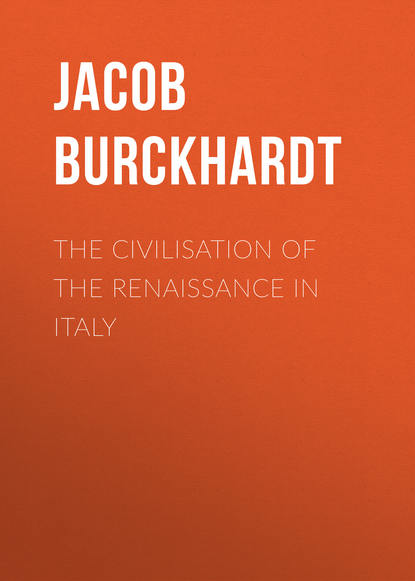По всем вопросам обращайтесь на: info@litportal.ru
(©) 2003-2024.
✖
The Civilisation of the Renaissance in Italy
Настройки чтения
Размер шрифта
Высота строк
Поля
Lil. Greg. Gyraldus, De poetis Nostri Temp. speaking of Collenuccio. Filelfo, a married layman, delivered an introductory speech in the Cathedral at Como for the Bishop Scarampi, in 1460. Rosmini, Filelfo, ii. 122, iii. 147.
550
Fabroni, Cosmus, Adnot. 52.
551
Which, nevertheless, gave some offence to Jac. Volaterranus (in Murat. xxiii. col. 171) at the service in memory of Platina.
552
Anecdota Lit. i. p. 299, in Fedra’s funeral oration on Lod. Podacataro, whom Guarino commonly employed on these occasions. Guarino himself delivered over fifty speeches at festivals and funerals, which are enumerated in Rosmini, Guarino, ii. 139-146. Burckhardt, 332. Dr. Geiger here remarks that Venice also had its professional orators. Comp. G. Voigt, ii. 425.
553
Many of these opening lectures have been preserved in the works of Sabellicus, Beroaldus Major, Codrus Urceus, &c. In the works of the latter there are also some poems which he recited ‘in principio studii.’
554
The fame of Pomponazzo’s delivery is preserved in Paul. Jov. Elogia Vir. Doct. p. 134. In general, it seems that the speeches, the form of which was required to be perfect, were learnt by heart. In the case of Giannozzo Manetti we know positively that it was so on one occasion (Commentario, 39). See, however, the account p. 64, with the concluding statement that Manetti spoke better impromptu than Aretino with preparation. We are told of Codrus Urceus, whose memory was weak, that he read his orations (Vita, at the end of his works. Ven. 1506, fol. lxx.). The following passage will illustrate the exaggerated value set on oratory: ‘Ausim affirmare perfectum oratorem (si quisquam modo sit perfectus orator) ita facile posse nitorem, lætitiam, lumina et umbras rebus dare quas oratione exponendas suscipit, ut pictorem suis coloribus et pigmentis facere videmus.’ (Petr. Alcyonius, De Exilio, ed. Menken, p. 136.)
555
Vespas. Fior. p. 103. Comp. p. 598, where he describes how Giannozzo Manetti came to him in the camp.
556
Archiv. Stor. xv. pp. 113, 121. Canestrini’s Introduction, p. 32 sqq. Reports of two such speeches to soldiers; the first, by Alamanni, is wonderfully fine and worthy of the occasion (1528).
557
On this point see Faustinus Terdoceus, in his satire De Triumpho Stultitiae, lib. ii.
558
Both of these extraordinary cases occur in Sabellicus, Opera, fol. 61-82. De Origine et Auctu Religionis, delivered at Verona from the pulpit before the barefoot friars; and De Sacerdotii Laudibus, delivered at Venice.
559
Jac. Volaterrani. Diar. Roman. in Murat. xxiii. passim. In col. 173 a remarkable sermon before the court, though in the absence of Sixtus IV., is mentioned. Pater Paolo Toscanella thundered against the Pope, his family, and the cardinals. When Sixtus heard of it, he smiled.
560
Fil. Villani, Vitae, ed. Galetti, p. 30.
561
See above, p. 237, note 3.
562
Georg. Trapezunt, Rhetorica, the first complete system of instruction. Æn. Sylvius, Artis Rhetoricae Praecepta, in the Opera, p. 992. treats purposely only of the construction of sentences and the position of words. It is characteristic as an instance of the routine which was followed. He names several other theoretical writers who are some of them no longer known. Comp. C. Voigt, ii. 262 sqq.
563
His life in Murat. xx. is full of the triumphs of his eloquence. Comp. Vespas. Fior. 592 sqq., and Commentario, p. 30. On us these speeches make no great impression, e.g. that at the coronation of Frederick III. in Freher-Struve, Script. Rer. Germ. iii. 4-19. Of Manetti’s oration at the burial of Lion. Aretino, Shepherd-Tonelli says (Poggio, ii. 67 sqq.): ‘L’orazione ch’ei compose, è ben la cosa la più meschina che potesse udirsi, piena di puerilità volgare nello stile, irrelevante negli argomenti e d’una prolissità insopportabile.’
564
Annales Placentini, in Murat. xx. col. 918.
565
E.g. Manetti. Comp. Vesp. Commentario, p. 30; so, too, Savonarola Comp. Perrens, Vie de Savonarole, i. p. 163. The shorthand writers, however, could not always follow him, or, indeed, any rapid ‘Improvisatori.’ Savonarola preached in Italian. See Pasq. Villari: Vita di Savonarola.
566
It was by no means one of the best (Opuscula Beroaldi, Basel, 1509, fol. xviii.-xxi). The most remarkable thing in it is the flourish at the end: ‘Esto tibi ipsi archetypon et exemplar, teipsum imitare,’ etc.
567
Letters and speeches of this kind were written by Alberto di Ripalta; comp. the Annales Placentini, written by his father Antonius and continued by himself, in Murat. xx. col. 914 sqq., where the pedant gives an instructive account of his own literary career.
568
Pauli Jovii Dialogus de Viris Litteris Illustribus, in Tiraboschi, tom. vii. parte iv. Yet he says some ten years later, at the close of the Elogia Litteraria: ‘Tenemus adhuc (after the leadership in philology had passed to the Germans) sincerae et constantis eloquentiae munitam arcem,’ etc. The whole passage, given in German in Gregorovius, viii. 217 sqq. is important, as showing the view taken of Germany by an Italian, and is again quoted below in this connection.
569
A special class is formed by the semi-satirical dialogues, which Collenuccio, and still more Pontano, copied from Lucian. Their example stimulated Erasmus and Hutten. For the treatises properly so-called parts of the ethical writings of Plutarch may have served as models.
570
See below, part iv. chap. 5.
571
Comp. the epigram of Sannazaro:
‘Dum patriam laudat, damnat dum Poggius hostem,
Nec malus est civis, nec bonus historicus.’
572
Benedictus: Caroli VIII. Hist. in Eccard, Scriptt. vi. col. 1577.
573





